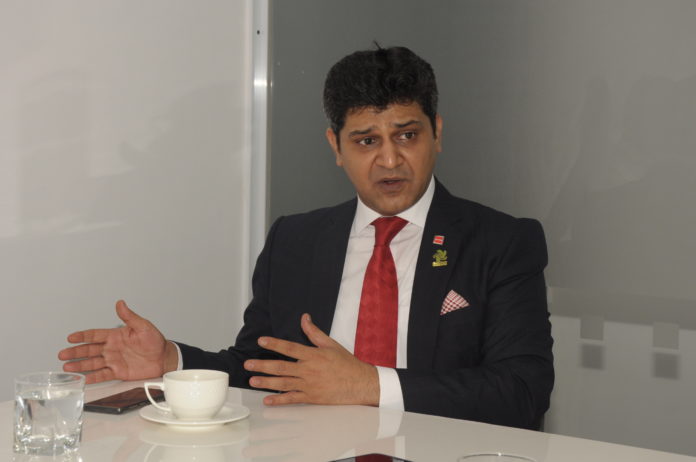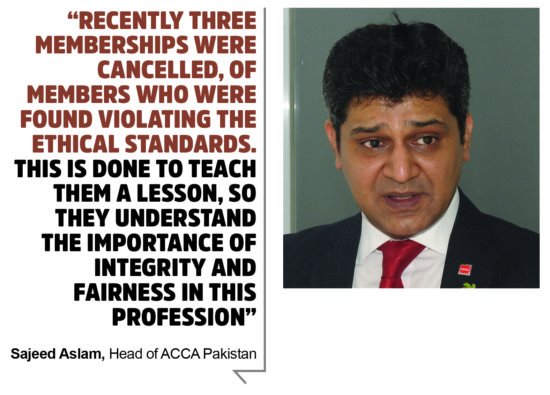
The Association of Chartered Certified Accountants (ACCA) – a global body of professional accountants, is keen to groom its members as ‘strategic business leaders’, to help them cope with the challenges found in the new-age business environment, says Sajjeed Aslam head of ACCA Pakistan.
“Today’s finance and accounting professionals must learn to build trust, learn to communicate, advice and influence the top-management. They can understand the complex issues, only if they have a strategic mind and intent, as we are preparing them for that”, Sajjeed Aslam told Profit during an exclusive interview.
Globally, ACCA has 208,000 members and 503,000 students in 172 countries, while in Pakistan, we have over 35,000 members. Its head office is based in the United Kingdom (UK), where the decision-makers of this institution are stationed. They have the authority to grant memberships or cancel any membership.
As ACCA Pakistan celebrated the ‘Global Ethics Day’ it has pledged to play a vital role in raising the country’s GDP, by increasing the number of qualified ACCA members, graduating every year.
ACCA helps to develop local skills, to reduce capital outflow, brain-drain and other pressures on the local education system. It offers choices for students and creates development-opportunities through healthier competition among foreign and local institutions, hence the quality and performance of the workforce improves. It is particularly beneficial for developing countries like Pakistan where reducing the brain-drain is a critical need, Sajjeed claimed.
And strategic forward-thinking accountants, the world needs. When you study with ACCA, you can take your career in any direction. You open doors to the best and the most interesting roles all over the world. You become one of the sought-after finance professionals in the world. Sajjeed claimed.
Sajjeed Aslam also said that ACCA is producing approximately 1300-1400 qualified ACCA members every year and this number is still much lower than the required number of qualified accounting professionals in the country. In the current scenario, Pakistan requires around 40,000 to 50,000 accountants to fulfil its demand in the industry.”
“The global finance outsourcing market size is around $35 billion, which is undergoing double-digit growth of around 12 per cent annually. If Pakistan succeeds in getting a share of 10 percent out of the total, it will help in the creation of around 100,000 accounting jobs with a services export-volume of $3 billion in the next five years. With this vision, we are helping our members to be business leaders. Through their journey to learn business leadership, they can evolve as a CEO, board member or entrepreneur.” he added.
“In the coming days, ACCA will also strive to expand its partnerships in Pakistan, so as to give more opportunities to its members and help them understand the evolving skills and technological solutions relating to professional accounting. To maintain their relevance in Pakistan and their competitive-edge globally, we do this through partnerships. In Pakistan, we have a number of partnerships with leading institutions and numerous universities. We are interested in expanding our network through valuable partnerships, by engaging with other prestigious institutions”, he said.

Sajjeed Aslam said the global body of professional accounting is currently undertaking extensive research in different areas and the research studies are also supporting our members in Pakistan and across the world. There are new business-models like frugality, mass-customization and ‘pay-when-you-want’. A lot of these are technology-driven. So, the accountants of the future will have to understand all these intricacies. ACCA is focused on improving the brand awareness of this professional-qualification, to gain more ground in the corporate circles of Pakistan.
Mr Aslam said, “the need of ACCA qualified professionals in the public sector is also rising to increase the GDP of Pakistan.” Discussing the importance of an ACCA qualification, he said, “an ACCA is not just an accountant who prepares audit reports, he is thoroughly trained in all relevant fields to perform well in diverse fields relating to his specialization. “ACCA education teaches them the correct and optimum use of their available resources, to excel in the long-run.
Talking about the ethical standards and their role in increasing the GDP of the country he stated that an ACCA is inspired to be aware and follow the ethical standards and the essence of integrity in their profession. If they are found violating any ethical standards or ignoring any key information, for whatever reasons, the membership of such practitioners may even be cancelled. In case the ACCA world-body cancels their membership, their years of training and education will become void, and they are back to the point where they started their ACCA program.

“Recently three students were relegated who were found violating the ethical standards. Ethics is central to being a respected and trusted professional. So for ACCA member, ethics isn’t just for a day; it is a 24/7 and 365 days of practice. That’s why we have the ACCA rulebook and the ACCA code of ethics and conduct – and that’s why we place ethics and professionalism at the heart of the ACCA qualification. It is also why we have our ethics and professional skills module. This is done to teach them a lesson, so they understand the importance of integrity and fairness in this profession. Corrupt practices or evasion of taxation are major crimes for accountants. Ethical standards help the nation build a better economy with transparency to eventually improve the GDP. He further added that the Public Sector companies will be the ones gaining most benefits from the ACCA qualified professionals, so they are should allocate higher salaries for them.
Informing Profit about the number of accountants present in the country, he said they numbered approximately 14,000, out of which around 5,200 are ACCA qualified. And those ACCA qualifying from Pakistan are amongst the best globally, they are usually paid 2-3 times higher in many countries and that is the reason, nearly 50 percent of our accountants get highly rewarding jobs internationally.”
With the new government in, Aslam is optimistic that the relevant authorities will be able to support the nurturing of a higher number of ACCAs in the country. “Presently there are 21 institutions in Pakistan providing ACCA studies and conducting examinations to produce around 1,400 ACCA members every year. We have the infrastructure, and teachers to produce the required number of professionals, however, we need to mobilize the resources and investments in this direction. Once our economy has inducted a sufficient number of ACCA’s, the country can even export this expertise and qualified human resources to the international markets. ACCA is committed to helping the government and the country achieve its economic goals.
The main challenge of ACCA is to make the international standard of professional education, available locally and that too at an affordable price. This will nurture a globally competitive workforce for Pakistan. ACCA education complies with the global trends in higher education, and the members are inducted internationally, across all English speaking countries like the UK, USA and Australia. Even foreign students from several countries are keen on qualifying as an ACCA. Due to excessive demand for higher education, Pakistan can also export educational services to these countries. It is possible through all or any of the above strategic modes of cooperation.
Study/Research:
In Pakistan, ACCA is registered with the higher education commission (HEC). It starts providing education to the students after Matric, Intermediate and B.Com in Pakistan. The students have to clear 13 exams in 4-5 years.
In a research report carried out by Rahul Choudah – the Director of Research at WES (World Education Services), New York, revealed a new growing consumer-class in Asia, which will expand a new segment of students who are willing to pay for a global educational experience, while staying in their home country or region. He termed this segment of students as “GLOCALS” global aspirations – local experience.
The study concluded that “GLOCALS” are characterized by aspirations that usually outstrip both their ability to afford a full fee-paying overseas education and their academic merit to gain admission to an overseas institution, with financial aid.
A perfect example was the growth of Dubai as a study destination for many South-Asian students, including Pakistan, through international branch campuses showing the growth of such students’ population. Similarly, Malaysia has also several foreign university branch campuses and the country plans to expand further in its foreign university branch campus portfolio.
Based on current trends, economic progress and geopolitical development, the outflow of knowledge-seekers from the developing-nations will compensate the inflow of students, especially between Asia, Europe and North America.
It is interesting to note that emerging superpower China, now receives more students than it sends abroad. According to a recent report, China’s international enrollment ranked 5th in the world, just behind the USA, Britain, France and Germany. Which means, it is making enormous progress in developing its high-quality education system, to make it a major study destination by 2020?
Introducing ACCA in the higher education sector, Aslam has clearly suggested that Asian countries are very keen to become hubs of international education. There is a viewpoint and concern about the excessive westernization of Asia’s unique cultures, languages, traditions and heritage. There are warnings over challenges and possible dangers posed by ACCA education mainly from the receiving countries.
Higher Education Commission:
Pakistan’s higher education landscape has seen a tremendous growth during the past decade, particularly after the establishment of Higher Commission Education ( HEC), which was formed through a Presidential order in 2002. It is a commission headed by the Chairman which reports directly to the Prime Minister, for all matters relating to the Higher Education Provision in Pakistan. Currently, there are 183 recognized universities and degree awarding institutions in Pakistan both public and private, enrolling more than 1.2 million students. The private sector is growing rapidly and almost 40 per cent of these higher education providers are from the private sector.
Foreign education providers also operate in the country mainly through the collaborative mode of delivering programmes with local institutions. All such programmes require the approval of HEC. HEC recognizes the significance of Transnational Education (TNE) and how this can benefit the quality of teaching and research in Pakistan whilst helping the country to meet its skill needs.

Sajeed Aslam says that international education in Pakistan is still limited in its scope when compared to other developing countries.
It is pertinent here to say that HEC has been working closely with its counterparts in different countries on harnessing the issues of quality assurance. HEC wants to play a pivotal role in setting up collaborations and providing information for foreign institutions interested in investment, including an overview of university landscape and possible partners.
The issues of international qualifications, dual degrees/joint degrees have been under extensive debate since the past many years in Pakistan. This initiative by HEC and relevant authorities will pave the way for the development of foreign programmes in Pakistan.
Hopefully, now Pakistani students aspiring to study for a recognized international qualification, will be able to do so, without having to leave their home country, or spending huge foreign exchange and in the process, the risk of brain drain will reduce.







ACCA has turned into such a huge sham. Please ask ACCA Pakistan to provide figures for how many ACCA members are actually employed in ACCA recognized firms versus the number of members passing out.
I have seen countless classmates drop out of discontinue ACCA due to the lack of relevant jobs within the Pakistani job market.
ACCA Pakistan needs to organize employer sessions and ensure that companies are hiring members and associates (part qualified students) at competitive rates which atleast justify the cost incurred while doing ACCA.
Iam ACCA qualified. I cannot find articles in any pakistan audit firm.because they are only hiring CA pakistan students.so after doing ACCA your all money is wasted and your all effort is worthless.because ACCA body is just commercial organization extracting fees from its students.the body have no influence on any organisation in pakistan.so refrain from doing ACCA and protect your future.
I am an ACCA member. I think job market for ACCA is not good in Pakistan moreover now even in gulf we people find it difficult to get hired. This is because we have more members than demand.
Comments are closed.